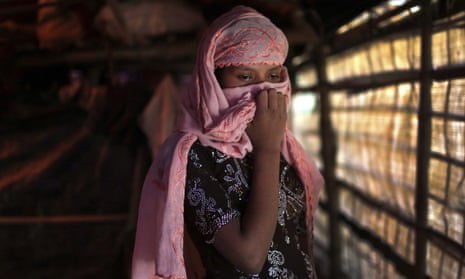Nomtaz Begum had lived all her life in Myanmar. Two years ago, men in uniform came to her village. They killed the men there, including her husband and three small children, boys aged two, five and 11.
She was raped by six of the soldiers, one after the other. They left after setting her house on fire. Badly burned, Begum and her daughter hid in the forest for four days before they were able to flee, making their way to a refugee camp.
This was one of scores of heart-wrenching accounts of sexual assault, fear and remarkable inner strength we have heard, from Cox’s Bazar in Bangladesh to Yemen and the Democratic Republic of the Congo.
Now it is time to end this scourge. The UN, governments, the International Committee of the Red Cross and civil society organisations are coming together in Norway this week for a first-of-its-kind conference on ending sexual and gender-based violence in humanitarian crises.
The aim is to strengthen collective responsibility, promote best practices and increase funding and political commitment to prevention and effective response.
The money we raise in Oslo – for civil society, including women’s organisations working tirelessly to support survivors, as well as UN-coordinated response plans, appeals by the Red Cross and Red Crescent movement, and other mechanisms – will specifically address sexual and gender-based violence.
One in three women experience physical or sexual abuse in their lifetime, and this form of violence is greatly exacerbated during humanitarian crises caused by conflict or natural disasters. Boys and men are affected too.
When law and order collapse and food, water, shelter, education, and healthcare are scarce, millions of women and girls become more vulnerable, often resorting to negative ways of coping such as child marriage and survival sex.
In 2019, roughly 140 million people are in need of humanitarian assistance, of whom 35 million are women and girls of reproductive age. They require lifesaving health services, psychosocial and livelihood support, legal aid and justice, but also interventions to prevent sexual and gender-based violence in the first place.
For survivors and their communities, the devastating consequences of sexual and gender-based violence include injuries, unwanted pregnancies, fistulae, sexually transmitted infections including HIV, trauma and death. Survivors often face social rejection and exclusion that increase their vulnerability to further abuse and exploitation. Many therefore never report the violence.
Yet our interventions during humanitarian crises remain chronically underfunded, accounting for well under 1% of the record $15bn (£12bn) provided by donors to assist people through UN-coordinated humanitarian response plans last year.
Our strategy to address these shortcomings requires three steps.
First, we must put survivors like Begum at the centre of our crisis response. Rape, sexual slavery, trafficking, forced or early marriage and intimate partner violence are just some of the abuses women and girls face. We must do more to engage, listen to and support those who experience sexual and gender-based violence.
Second, we need to focus on prevention and address gender inequality, the root cause of gender-based violence, which is magnified during humanitarian crises. This requires sustained efforts by communities and grassroots organisations as well as increased attention from governments and the international community.
Third, more needs to be done to hold perpetrators to account. Humanitarian organisations and others need to work with governments on policies and laws to prevent violence and enforce protection. More training is needed for military personnel, public officials, law enforcement agents and armed groups on domestic and international humanitarian law, and how to address sexual violence. Laws must be respected and enforced.
Civil society groups, NGOs and survivors are key in guiding effective prevention and response. The call we reiterate in Oslo to end sexual and gender-based violence in humanitarian crises is a tribute to the courage of survivors, and to women like Nomtaz Begum. We must live up to their strength and commitment.
Natalia Kanem is the executive director of UNFPA. Mark Lowcock is the UN under-secretary-general for humanitarian affairs and emergency relief coordinator.
